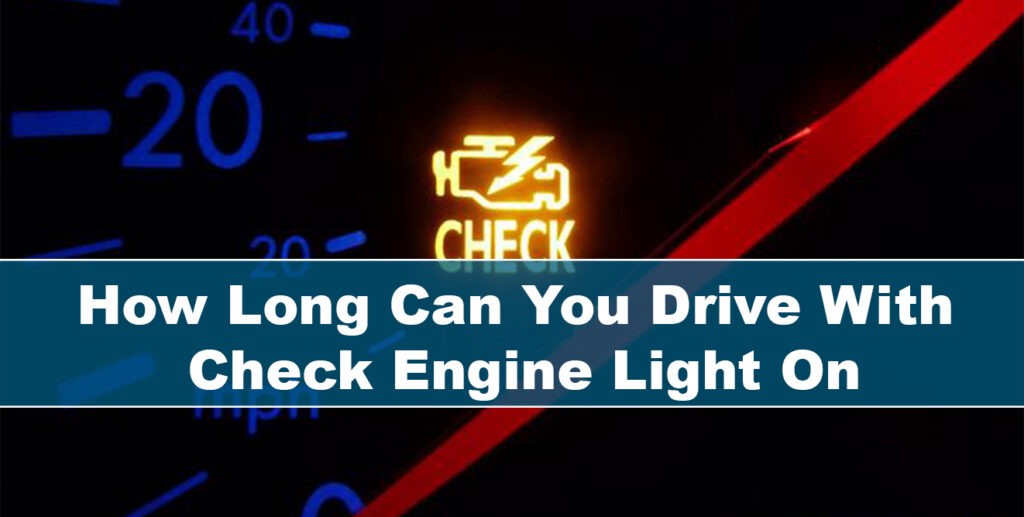As long as your car is running smoothly, you can drive it with the check engine light on. Though, a check engine light is one of the most talked-about light issues in the car dashboard.
This post will help you get a basic knowledge if you should even drive your car with check engine lights on in the first place, how long can you drive with the check engine light on? and the possible effects of driving with the check engine light on. Related Article:Easy Guide on How to Disable Check Engine Light Permanently
What is the check engine light?
The check engine light is also known as MIL (Malfunction Indicator Light), it is a sign sent by the car Engine computer significantly that something might be wrong.
The computer is known as ECU, it simply performs all the math your vehicle needs to run smoothly.
The ECU performs some tests on your vehicle powertrain that is all the parts essential for the smooth running of the vehicle to make sure that every part is adequately functional.
The ECU performs this function only when the car is put into ignition.
Where is the check engine light located?
Every vehicle has quite some warning lights on its dash with a different meaning to each light signal.
A car vehicle check engine light is also located at the dash, and can be identified with either an engine symbol or the words “check engine”.
The basic function of a check engine light is to signal the malfunctioning of one of the car sensors, therefore, the car is likely not running properly.
The check engine light can therefore be either solid IR flashing. It is important to mention that, the check engine light should within five seconds of ignition be off of which is meant to be on when you start your vehicle.
Related Article:
- What Causes Check Engine Light To Come On Honda Accord
- Check Emission System Honda Civic 2012 2013, 2014 & 2015
- How to shut off the SRS light in a 2007 Mitsubishi
- How to Bypass Airbag Light Volkswagen
- Can You Get Emission Test With Check Engine Light On
- Toyota Prius Check Engine Light Diagnosis (2007- 2017 )
- How to Read & Reset Check Engine Light Jeep Wrangler
- Load Capacity For Towing With Jeep Wrangler Unlimited
Solid or Flashing Check engine light
• Solid check engine light
A solid car engine light signifies that there is a stored code in the computer of your car. It also signifies that the fault has been reoccurring and therefore needs urgent attention by a mechanic where the inspection will be made on the stored check engine light and a test will be run on the car computer codes.
• Flashing check engine light
A flashing check engine light means your car’s catalytic converters will be damaged if you drive the car. The flashing signal means the car should not be driven at all. Doing so would cause serious damage to the vehicle.
Can You Drive With the Check Engine Light On?
With a solid check engine light, yes, you can drive your car for as long as it is running efficiently. Once you notice it is likely not running smoothly, then you should avoid driving the car.
With a flashing check engine light on the other hand, driving such a car should be avoided. Sure, it can run but certainly not smoothly and if you run with it, you will likely get the catalyst converter damaged and it will subsequently cost you more to replace as most cars do come with more than one catalyst converter.
How Long Can You Drive With the Check Engine Light On?
You can drive your car for hundreds of miles smoothly when you have a solid check engine light. You can even run more miles without any issues.
But that largely depends on the stored code of your car computer. The car uses made up sensor valves when the engine sensor has issues keeping it running.
The only effect would be a reduction in your car fuel efficiency which is likely to affect the car’s overall performance but surely you can drive your car for miles smoothly without any major issues.
Though it is not an emergency, but an appointment should be made with your mechanic to detect and treat the causes.
What Could Cause Your Check Engine Light to Come On?
As mentioned earlier, the Check Engine Light is also known as Malfunction Indicator Light (MIL), it is, therefore, a warning light that signifies that there is a potential issue with your car and it is often detected by the car computer called ECU. So what could cause the check engine light to come on?
An issue has been detected in the complex collection of components and sensors in the car, this, therefore, triggers the light to turn on.
If the check engine light turns on, you shouldn’t call emergency and this is because it isn’t an emergency case.
You should rather check for any possible malfunctioning of your vehicle, mostly pay attention to any noise made by the car.
If you couldn’t find anything serious, you can simply drive to your destination and attempt to visit your mechanic next.
There are two stages to the warning check engine light;
- Solid – Indicates a minor fault
- Flashing – Indicates a severe fault
Your mechanic will have to read the fault codes your car computer-generated making use of a scan tool. When the fault is detected he will state the parts that need to be repaired or replaced, and that can cause a lot based on the seriousness of the fault
The interesting feature of the check engine light is that it can turn on for a minor issue like a loose fuel cap or something more serious like an engine knock or some serious damage to other parts of your vehicle.
Most Common Causes for the Check Engine Light to Come on
• Faulty Oxygen Sensor
The oxygen sensor performs the basic function of measuring the quantity of oxygen present in your car exhaust system This information is sent to your car’s computer for adjustment of fuel and engine air mixture.
With a damaged oxygen sensor, your vehicle will likely consume more fuel with large emission production.
This is certainly not an emergency issue but you should get your car to your mechanic if such fault is noticed.
• Faulty Fuel Cap
When your vehicle fuel system has a vapour leak due to a faulty or lost fuel cap, the check engine light is likely to come on. More severe cases could involve some serious leak in the fuel system at the upper portion.
Without visiting your mechanic, you can replace or tighten the fuel cap, and your vehicle can move smoothly.
With a few miles covered, the check engine light should go off, if it doesn’t, visiting your mechanic would be the next option.
• Failed Catalytic Converter
A catalyst converter’s main function involves controlling emissions in the vehicle exhaust system. It converts gases that are harmful such as carbon monoxide into byproducts that are less harmful to the environment.
A failed catalyst converter will cost your vehicle to consume more fuel and produce large emissions and reduce the overall efficiency of the vehicle.
It is quite expensive and as mentioned earlier most cars come with more than one catalyst converter.
If your car check engine light turns on due to the catalyst converter, you should by all mean not drive the car. It should be taken immediately to your mechanic.
Driving will cause severe damage to your car and you will end up paying more money for getting a replacement or repairing.
• Faulty Mass Airflow (MAF) Sensor
Mass Airflow Sensor known as MAF performs the basic function of aiding a car computer to detect the quantity of fuel that is needed to be added due to the quantity of air going into the vehicle. A dirty air filter and an improperly placed air filter are the basic cause of a faulty mass sensor.
This certainly is not an emergency case and certainly not severe also, but until replacement or proper installation is done, your vehicle will likely consume more fuel and its efficiency is likely to get reduced.
In other words, expect nothing superb from your car. A professional mechanic should be able to correct the fault and your car should be running smoothly.
• Faulty Spark Plugs
Having a faulty spark plug in your car could easily trigger the check engine light to turn on. You must constantly make sure you replace the spark plug as described in your car maintenance manual. If you haven’t, visit your service proper to get a replacement done.
If you can’t get it done yourself, you should visit your mechanic for a smooth and quick replacement. When done well, the check engine light should turn off and your car should be in a good condition to run smoothly.
• Faulty Ignition Coil
This is a big part of the car ignition system which performs the basic function of being an induction coil by simply transforming your car voltage to the needed volts to light the spark plug for the ignition of the car engine for air and fuel mixture.
The check engine light will likely turn on due to the burning of the ignition coil. If you noticed it is faulty, you need to get your car ignition system diagnosed by a professional mechanic, to make repairs or replacement of necessary parts for the smooth running of your vehicle.
• Faulty Charging System
I’m pretty sure we all want to avoid jump starting our cars. You should therefore make sure your car battery checks frequently along with the charging system. They should always be at their best for the smooth functioning of the car.
A fault with the car’s electrical charging system or the alternator will likely not allow your car to start. You should therefore visit your mechanic for a possible fix to the issue.
In conclusion
A check engine light doesn’t always mean an emergency, you should not, therefore, panic when it turns on while you’re driving.
Just note that; a solid check engine light means that there is an issue with your car but certainly you can still drive to your destination.
While a Flashing check engine light means that the issue might be serious and you should stop the vehicle for a check for any possible strange issues.
I noticed you should call your mechanic. Or if you noticed nothing you can drive to your destination and visit your mechanic next.
Related Articles:
- How to Check Prius Hybrid Battery Health (How to Test Prius Battery Cells)
- How to Reset Check Engine Light Dodge Caravan Light Codes
- Guide on How To Pass NJ Inspection with Check Engine Light
- How Many Miles Can You Drive with Check Engine Light On?
- Does Check Engine Light Turn Off Automatically After Repair
Hi dear, I am Gift Dennis I have been working as a Radiographer for over 8 years, but I switch my profession to what I love which is auto body part repairs and I recently got my automotive diploma last August 2020 as an auto-body repair technician. I love fitness and everything about cars, so here is where I share my expertise and experiences with those who wish to hear about them.


